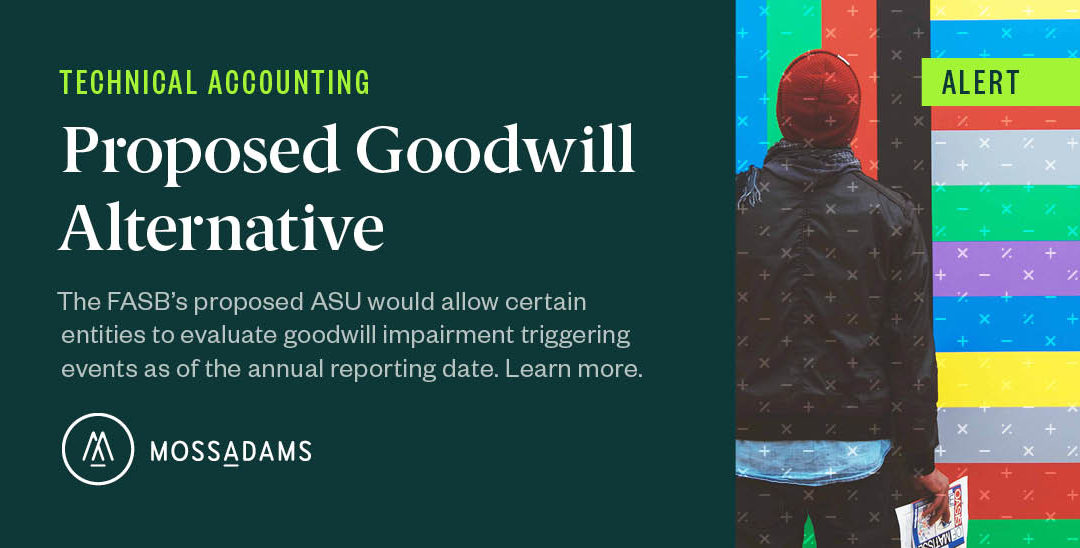This article, "FASB Proposes Accounting Alternative for Goodwill Impairment Triggering Events," originally appeared on MossAdams.com.
On December 21, 2020, the Financial Accounting Standards Board (FASB) issued proposed Accounting Standards Update (ASU), Accounting Alternative for Evaluating Triggering Events.
The proposed ASU responds to concerns raised about the cost and complexity of private companies evaluating triggering events at an interim date and proposes an accounting alternative that would allow certain entities to evaluate goodwill impairment triggering events as of the annual reporting date only. The proposed accounting alternative would apply to private companies and not-for-profit entities that only report goodwill on an annual basis.
Comments on the proposed ASU are due January 20, 2021.
Background
Under current generally accepted accounting principles (GAAP), entities are required to monitor and evaluate goodwill impairment triggering events throughout the year. Goodwill must be tested for impairment when a triggering event occurs that indicates it’s more likely than not that the fair value of a reporting unit is less than it’s carrying value.
The triggering event analysis and resulting goodwill impairment test are required to be performed on the date the triggering event occurs without the use of hindsight or known changes to facts and circumstances after the triggering event date.
Key Provisions
The proposed ASU was issued to help alleviate the cost and complexity of applying the triggering event analysis and measuring the resulting impairment at an interim date for entities that only report annual GAAP-compliant financial statements.
The proposed accounting alternative is also intended to address concerns raised about the value and usefulness of evaluating a triggering event at an interim date for certain entities. Many stakeholders have expressed that an interim impairment may not provide meaningful information for entities that only report financial information on an annual basis because the facts and circumstances that led to the potential triggering event may change by the end of the annual reporting period.
These concerns have become more apparent due to economic uncertainty related to the COVID-19 pandemic. The proposed accounting alternative would be available on a permanent basis, however, and isn’t limited to the effects of the COVID-19 pandemic.
Proposed Accounting Alternative
The proposed accounting alternative would provide private companies and not-for-profit entities that only report goodwill—or accounts that would be affected by a goodwill impairment, such as retained earnings and net income—on an annual basis with an option to perform the identification and evaluation of a triggering event for goodwill impairment only as of their annual reporting date.
Entities that elect this alternative wouldn’t be required to monitor for goodwill impairment triggering events in interim periods and would instead evaluate the facts and circumstances as of year-end to determine whether it’s more likely than not that goodwill is impaired.
Under the proposed amendments, entities would be able to apply the proposed accounting alternative either separately from, or together with, the existing accounting alternatives for goodwill.
Scope
As proposed, the accounting alternative would apply to private companies and not-for-profit entities that only report goodwill on an annual basis.
Entities would be precluded from applying the proposed accounting alternative if interim financial information, prepared in accordance with GAAP, is provided to users that includes goodwill or line items that would be affected by a goodwill impairment.
The proposed accounting alternative would be limited to goodwill that is tested for impairment in accordance with Subtopic 350-20, Goodwill. The proposed accounting alternative wouldn’t apply to equity-method goodwill.
Entities would be prohibited from analogizing to the proposed accounting alternative for long-lived assets and other intangibles.
Effective Dates
The proposed accounting alternative would be effective for annual reporting periods beginning after December 15, 2019. Early adoption would be allowed for entities that haven’t yet issued financial statements or made their financial statements available to be issued as of the date the proposed accounting alternative is issued as a final ASU.
We’re Here to Help
For more information on how the proposed accounting alternative could affect your business, contact your Moss Adams professional.


